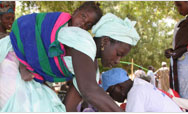 |
|
 |
 |
|
 |
 |
 |
USAID Information:
External Links:
|
|
 |
 |
|
President's International Education Initiative
Expanded Education for the World's Poorest Children
Honduras Fact Sheet
FOR IMMEDIATE RELEASE
September 24, 2007
Press Office: 202-712-4320
Public Information: 202-712-4810
www.usaid.gov
Education Overview
Honduras has among the lowest education indicators in the Latin America and Caribbean region, but the Government of Honduras has, to date, demonstrated a strong commitment to reform. In 2001, before the start of the Fast Track Initiative, only 70% of children completed primary school. Just four years later, by 2006, that figure was nearly 85%. Honduras is one of the few developing countries that may truly achieve Education for All (EFA) - 100% primary school completion - by 2015. However, to achieve this goal, Honduras must reduce repetition and dropout in the early grades of primary school, where 80% of primary school repetition occurs. Net primary enrollment was above 90% in 2005, while survival to 5th grade was only 70%.
Key Elements of the Fast Track Initiative (FTI)
Honduras' FTI focuses on 1) strengthening the efficiency of basic education; 2) improving the quality and efficiency of teacher training and performance; and 3) strengthening pre-primary, bilingual, and rural education. The U.S. Agency for International Development (USAID) and other donors prioritize investments and provide resources for EFA-FTI based on a Memorandum of Understanding signed by USAID, other donors and the Honduran Ministry of Education to achieve EFA-FTI goals. In implementing the strategies included in the Honduran Proposal for EFA-FTI, approved by international donors in 2002, annual work plans and goals are jointly developed by the Ministry of Education and donors. Other donors- in the education sector are Sweden, Japan, Canada, Germany, Spain, the World Bank, Inter-American Development Bank, UNICEF, the European Union, Ibero-American States and the World Food Program. The Fast Track Initiative was created in 2002 as a partnership between developing countries and donors to accelerate the delivery of universal primary education in the world's poorest countries.
Current Program
USAID is helping the Ministry of Education develop academic standards in math and Spanish that are aligned with international standards, standardized monthly progress tests for all students in the 1st grade through high school, and end-of-year tests for each grade. USAID is also helping the MOE improve data collection and use - namely, using basic education statistics (dropout, repetition and student flow rates, and monthly standardized test results) to identify weak areas and obstacles to achieving EFA-FTI goals and using data to develop strategic plans for schools, districts and departments to achieve goals. USAID is also supporting decentralized teacher training and training for primary school supervisors to implement standards, standardized tests, strategic plans and related strategies to achieve EFA-FTI goals. These USAID investments are among only two donor initiatives reaching classroom teachers nationally at the present and are critical for achieving EFA-FTI goals
Illustrative Next Steps of the New Initiative
Illustrative new activities include a focus on improved teacher supervision and support and expansion of activities to train local education officials and support improved education management at lower levels of administration. The USAID Mission in Honduras may work with local non-governmental organizations to provide strategic planning support and monitoring and evaluation assistance to the 18 departments (regions) in the country, as well as assist parent and community groups to engage in monitoring the quality of education in their schools.
Mrs. Bush's Remarks at a Global Health and Literacy Luncheon
Back to Top ^
|


